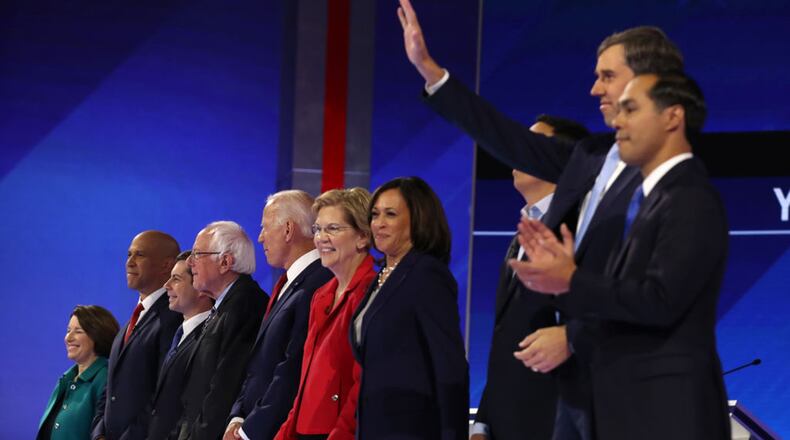Tuesday’s debate in Ohio will be the biggest scrum of presidential contenders yet for Democrats, as 12 White House hopefuls cram on the same stage for a showdown that could hinge on two seismic political developments that have erupted since the last time candidates met.
The first is the Democratic march toward the impeachment of President Donald Trump after a whistleblower’s allegations revealed he urged Ukraine’s president to pursue an investigation of former Vice President Joe Biden and his family.
The second is Trump’s decision to pull U.S. forces out of northern Syria, a rapid withdrawal that has infuriated some Pentagon officials and led to a swift Turkish assault on Kurdish forces that had been among the nation’s most reliable allies in the fight against the Islamic State.
The political dynamics have shifted, too, since the September debate in Houston. Biden is still the tentative front-runner, but U.S. Sen. Elizabeth Warren has inched up in the polls — and is leading Biden in a survey of some early-voting states — as she starts to consolidate support from liberals.
Biden, too, is facing blowback from the impeachment inquiry as the president and his Republican allies continue a drumbeat of unfounded attacks focusing on his son’s ties to Ukraine — and some of Biden’s Democratic rivals are less than eager to rally to his defense.
The debate at Otterbein University in Westerville will also serve as a key moment for U.S. Sen. Bernie Sanders, who is third in most polls but has been off the campaign trail since suffering a heart attack two weeks ago. The 78-year-old faces growing scrutiny from voters who question his health and ability to serve in the White House.
They’ll be ringed by candidates antsy and eager to make a move. U.S. Sen. Kamala Harris and Mayor Pete Buttigieg of South Bend, Ind., are both trying to position themselves as alternatives to Biden, but they’re stuck in the single digits in most polls.
And then there are the lesser-known contenders who hope to do something — anything — to break out of their polling doldrums. For many of those candidates, Tuesday’s event might be their best shot to qualify for the November debate, when contenders face a higher threshold to qualify.
That Nov. 20 showdown will be held in Georgia, and a group of state Democratic heavyweights will be carefully watching how officials in Westerville pull off their event. Here are a few more things to watch at Tuesday’s debate.
Biden’s new challenges
Biden has unhappily been dragged into the spotlight of the impeachment inquiry, as Trump has claimed without evidence that his rival pressed Ukraine to back off from a corruption probe into a Ukrainian gas company at a time when his son sat on the firm’s board.
He’s sure to be questioned about his son’s business activities before a nationwide audience, highlighting his struggle to balance his defense against Trump’s attacks while also pushing his own policy vision, which he has tried to frame as an extension of President Barack Obama’s legacy.
At the same time, he’s abandoned his restraint on impeachment, using blistering language to demand Trump’s removal from office while accusing him of “shooting holes in the Constitution” and betraying the nation.
Meanwhile, Warren is rising in recent polls — and presenting Biden with a sharp challenge in early-voting states. She’s largely avoided direct attacks at previous debates, but that could change as some of her opponents take aim at her “Medicare for All” stance.
Sanders’ return
As Warren’s star rises, Sanders’ presidential hopes could be dimming. The oldest of the remaining candidates, the Vermont senator will try to use the debate stage to prove his heart surgery was an unabashed success — and that his spirits are invigorated.
He raised another huge amount — about $25 million over the past three months, including $800,000 from Georgia donors — in yet another testament to his enduring support from grassroots liberals. But there’s no denying that Warren and other candidates are threatening his hold on those voters.
Foreign policy
Tuesday’s debate could shift at least some of the focus from domestic matters to foreign affairs, as Democratic candidates try to portray Trump’s withdrawal of U.S. troops from war-torn Syria as a betrayal of an implacable ally.
White House hopefuls have described the decision as impulsive and dangerous, and they have accused Trump of betraying Kurdish troops who have relentlessly battled Islamic State terrorists with U.S. help. Trump has defended his position as a calculated withdrawal meant to end an “endless war.”
The clock is ticking
The second-tier candidates will have another chance for a breakout moment. Buttigieg has recently shown an edgier side, accusing Warren of being “evasive” on health care. And following her strong performance in the first debate, Harris has struggled to regain any sense of momentum.
Other candidates face even more desperate circumstances. At least four have yet to qualify for the November debate in Georgia, and each faces pressure to capture attention from activists and donors before becoming an afterthought.
Among them is U.S. Rep. Tulsi Gabbard of Hawaii, who said she is “seriously considering” boycotting the debate and has accused the national party and the media of “rigging” the primary system against long-shot candidates.
About the Author
Keep Reading
The Latest
Featured



